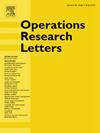具有一般效用的部分可观测离散时间贴现马尔可夫博弈
IF 0.8
4区 管理学
Q4 OPERATIONS RESEARCH & MANAGEMENT SCIENCE
引用次数: 0
摘要
在本文中,我们研究了状态过程为离散时间马尔可夫链的部分可观测零和博弈。我们在优化准则中考虑了一般效用函数。我们证明了有限地平线和无限地平线博弈的价值存在,并确定了最优政策的存在。主要步骤包括将部分可观测博弈转换为完全可观测博弈,该博弈还跟踪总贴现累计回报/成本。本文章由计算机程序翻译,如有差异,请以英文原文为准。
Partially observable discrete-time discounted Markov games with general utility
In this paper, we investigate partially observable zero sum games where the state process is a discrete time Markov chain. We consider a general utility function in the optimization criterion. We show the existence of value for both finite and infinite horizon games and also establish the existence of optimal polices. The main step involves converting the partially observable game into a completely observable game which also keeps track of the total discounted accumulated reward/cost.
求助全文
通过发布文献求助,成功后即可免费获取论文全文。
去求助
来源期刊

Operations Research Letters
管理科学-运筹学与管理科学
CiteScore
2.10
自引率
9.10%
发文量
111
审稿时长
83 days
期刊介绍:
Operations Research Letters is committed to the rapid review and fast publication of short articles on all aspects of operations research and analytics. Apart from a limitation to eight journal pages, quality, originality, relevance and clarity are the only criteria for selecting the papers to be published. ORL covers the broad field of optimization, stochastic models and game theory. Specific areas of interest include networks, routing, location, queueing, scheduling, inventory, reliability, and financial engineering. We wish to explore interfaces with other fields such as life sciences and health care, artificial intelligence and machine learning, energy distribution, and computational social sciences and humanities. Our traditional strength is in methodology, including theory, modelling, algorithms and computational studies. We also welcome novel applications and concise literature reviews.
 求助内容:
求助内容: 应助结果提醒方式:
应助结果提醒方式:


